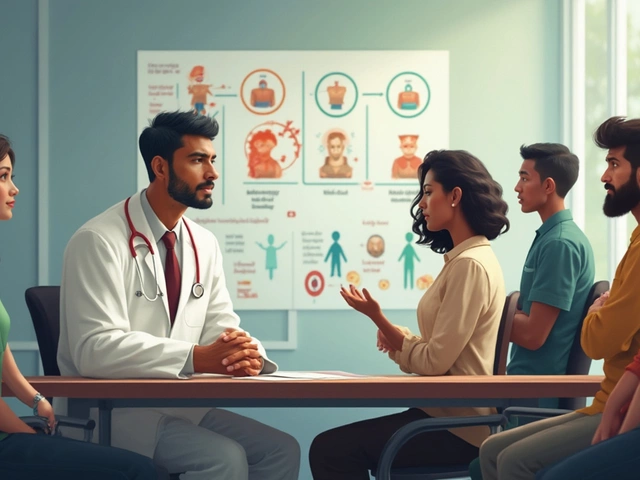
If you’ve ever tried therapy and walked out thinking, “Is this all there is?” you’re not alone. Sure, therapy can be life-changing—sometimes you get that 'aha' moment, or finally feel heard. But let’s be real. Sometimes, what makes or breaks someone’s recovery isn’t the therapy session itself, but what they do outside the therapist’s office.
Look at the research on what actually helps people get better. It almost always shows that talking isn’t the only thing that matters. It’s often the stuff you do after the appointments—calling a friend instead of isolating, joining a class that gives you something to look forward to, or just finding a reason to get out of bed. These things, sometimes, make a bigger difference than a therapist’s advice ever could.
Here’s the bottom line: therapy can be a boost, but it isn’t the only thing holding you up. Keep reading, because you might find a few things that work better for you—stuff you can start using today, without waiting for your next session.
- Why Therapy Isn’t Magic on Its Own
- Social Connection: The Game-Changer
- The Power of Purpose and Routine
- Physical Health Fuels the Mind
- Creative Expression and Play
- Pulling It All Together: Real-Life Tips
Why Therapy Isn’t Magic on Its Own
Most people think therapy fixes everything, but nobody talks about the times when it just stirs up old stuff and leaves you unsure what’s next. A recent survey from the American Psychological Association found that about 25% of people drop out of therapy before they finish a few sessions. That’s not because therapy is useless—it’s because getting better takes more than talking to an expert once a week.
For therapy to actually work, you have to do homework in real life. Therapists call it “practicing skills outside sessions,” but really it’s stuff like reaching out when you want to shut down, or trying one new thing each week, even if it’s awkward. Without putting this into action, most people see little real change.
There’s another truth. Therapy can give you tools and support, but it usually can’t rebuild your whole life. If you’re lonely, stuck in a draining job, or never get outside, even the best therapist can’t wave a wand and fix that. Studies done at Yale and Stanford show that half the battle is changing how you live, not just how you think.
Too many people expect miracles from therapy and feel disappointed when change is slow. The strongest improvements usually happen for those who combine therapy with other changes. So if it feels like your therapy isn’t “working,” you’re probably missing another piece of the puzzle—something only you can add in your daily life.
Social Connection: The Game-Changer
If therapy is like charging your phone, social connection is the power strip that keeps everything plugged in. People often ignore how much their mood and energy change just by being around someone who gets them. Everything from everyday chit-chat to deep late-night talks can boost your mind way more than scrolling solo or bottling stuff up.
You might think having lots of followers or friends on social media counts. Sorry, but texting doesn’t hit your brain the same way as hearing someone laugh at your joke in real life. Real moments with real people drop your stress hormones fast—one University of Oxford study found that laughing with friends increases pain tolerance by up to 10%. That’s your brain literally rewarding you for connection.
Don’t just take my word. Here’s why connection matters:
- Loneliness raises your risk of early death by 26%. That’s higher than obesity.
- One strong friendship can lower your risk of depression as much as regular exercise.
- Having someone to turn to in crisis makes therapy way more effective.
Check out the numbers below for a quick reality check:
| Factor | Impact on Mental Health |
|---|---|
| Loneliness | +26% mortality risk |
| Regular Social Contact | -30% depression risk |
| Social Commitment/Volunteering | -25% risk of cognitive decline |
Simple, right? But real connection takes effort. You can't just wait for an invite.
- Try reaching out to an old friend this week—send a voice note or meet for coffee.
- Join a hobby group, sports team, or volunteer gig. Shared activities often spark stronger bonds than small talk.
- If face-to-face feels tough, join a video call or online support group. It’s not perfect, but it’s a start.
Honestly, nothing beats the impact of solid connections when it comes to mental health. No pill or couch session can replace the feeling of being seen and heard by someone you trust.
The Power of Purpose and Routine
Ever notice how life feels easier when you have something—anything—to get up for in the morning? It's not just you. People with a clear sense of purpose or even a simple daily routine report less stress and bounce back faster from tough situations. This stuff goes way beyond just making to-do lists.
A huge study that tracked adults over 14 years found that people who felt their lives had meaning were 30% less likely to die during the follow-up period. That’s right: a sense of purpose can literally help you live longer. In mental health circles, structure and routine are often the first steps out of a rough patch. Think about it—when everything feels out of control, sticking to even a basic routine can make you feel grounded.
Let’s break it down. Why does routine work?
- Reduces decision fatigue: Less time stressing over what to do next means more mental energy for real problems.
- Promotes better sleep: People with routines—a wake-up time, a set bedtime—tend to sleep better, which improves mood and coping.
- Gives small wins: Checking off daily tasks builds confidence, and that snowballs into bigger changes over time.
- Keeps you moving: When you have a purpose or even a daily goal, you’re less likely to freeze up or shut down.
Even for people in therapy, therapists will push for behavioral changes—adding structure to the week or a reason to get out, no matter how small. Why? Because structure fills the gap when motivation is low. That’s not just talk. Below is a snapshot from a 2023 survey on routine and mental health:
| Habit | Reported Boost in Mood (%) |
|---|---|
| Consistent Morning Routine | 68 |
| Daily Exercise | 64 |
| Dedicated Relaxation Time | 56 |
Small steps count. Start with something easy, like setting the same wake-up time every day, or picking one thing to look forward to each week. Over time, these little habits add up and give you more control, which is what your mind craves during chaos. That’s the real power of purpose and routine—it’s not a magic bullet, but it’s close.

Physical Health Fuels the Mind
If you’re stuck in your thoughts, sometimes the fastest way out is to do something with your body. It’s not just a motivational slogan—your brain literally works better when your body is taken care of. For example, people who get regular exercise have lower rates of depression and anxiety, according to tons of studies. We’re not talking marathon running here—even a brisk twenty-minute walk can change your headspace for the rest of the day.
What you eat and how well you sleep also change how you feel, sometimes more than talking about your problems ever could. Most folks don’t realize that low vitamin D, poor nutrition, or not enough sleep can make you feel constantly low or irritable. If you skip meals or fuel up on junk all the time, your mood will crash—science backs this up.
So, if you want a mental health boost, try:
- Moving your body daily, even if it’s just a short walk or some stretches at home.
- Keeping a steady sleep schedule (aim for 7–8 hours, and try not to stare at your phone right before bed).
- Eating real meals with protein, veggies, and healthy fats—not just snacks or fast food.
- Staying hydrated, because even mild dehydration messes with thinking and energy.
Don’t overthink it. Small changes stack up faster than you’d expect. Next time you feel stuck, do something physical—your mind will thank you. Out of all the mental health hacks, taking care of your therapy basics often delivers the biggest boost.
Creative Expression and Play
Ever notice how messing around with paint, music, or even LEGO can put you in a better mood? It’s not just about killing time. Creative expression and play actually activate parts of your brain that regular talking can’t reach. They tap into emotions and help you process feelings you might not even be able to name. That’s why art and music therapy aren’t just buzzwords—they’re actually recommended in places like the World Health Organization’s mental health guidelines.
Research from a Yale study showed that people who stuck with something creative—like drawing for 15 minutes a day—reported lower stress and more positive moods after a single week. It really doesn’t matter if you’re good at it; the point is to just do it. Getting into that “flow” state, whether you’re doodling, dancing, or cooking, rewires your brain in simple but powerful ways. Studies even link regular creativity to increased resilience and better problem-solving skills.
Play isn’t just for kids. When adults take time to play—think board games, pickup basketball, tossing a frisbee, or even goofing around with pets—they get a shot of dopamine, the feel-good brain chemical. Regular play can cut down anxiety symptoms and lower blood pressure, according to the American Journal of Play. Adults who play at least once a week are 30% more likely to report high life satisfaction compared to people who don’t play at all.
| Activity | Mental Health Benefit |
|---|---|
| Daily drawing | Less stress, better mood |
| Playing with pets | Lower anxiety, more happiness |
| Music making | Better social skills, less isolation |
| Team sports | More confidence, better friendships |
If you want to put this into practice, try picking any activity from that table. Don’t worry about being perfect. The main thing is to make space for play and creativity every week. These activities work hand-in-hand with therapy, and sometimes give you the boost you never knew you needed.
Pulling It All Together: Real-Life Tips
If you want real results, you’ve got to put different pieces together—not just lean on one thing, no matter how amazing therapy is. Experts say the best mental health outcomes usually happen when people combine several habits, so let’s break down some moves you can start right away.
- Therapy is important, but you need backup. Pair your sessions with regular check-ins with friends or family. In 2022, a survey from Mental Health America found that people who talk to at least one trusted person outside therapy are less likely to relapse.
- Structure helps. Set a daily routine, even if it's just small basics like making your bed or planning your next meal. A study by the University of Exeter showed that routines cut stress and boost energy, especially for people dealing with anxiety or depression.
- Don’t ignore your body. Regular exercise—even just a brisk 15-minute walk—raises mood-lifting chemicals in your brain. The WHO reports that exercise can cut depression symptoms by nearly a third. That’s bigger than some meds.
- Find a creative outlet. This isn’t about being an artist—it can be journaling, doodling, or playing music for fun. Creative activities lower stress and help you process emotions in a different way than words alone.
- If you’re stuck, try volunteering or helping others. A recent Harvard Health article says helping boosts your own well-being, sometimes even more than receiving help.
The secret? Stack as many of these habits as you can. You don’t have to overhaul your life. Start with one or two, keep them up for a couple of weeks, then add something new. Mix and match until you find your rhythm. And remember—self-improvement isn’t about being perfect. It’s about doing the next right thing, even on the rough days.





Rohan Talvani
I am a manufacturing expert with over 15 years of experience in streamlining production processes and enhancing operational efficiency. My work often takes me into the technical nitty-gritty of production, but I have a keen interest in writing about medicine in India—an intersection of tradition and modern practices that captivates me. I strive to incorporate innovative approaches in everything I do, whether in my professional role or as an author. My passion for writing about health topics stems from a strong belief in knowledge sharing and its potential to bring about positive changes.
view all postsWrite a comment